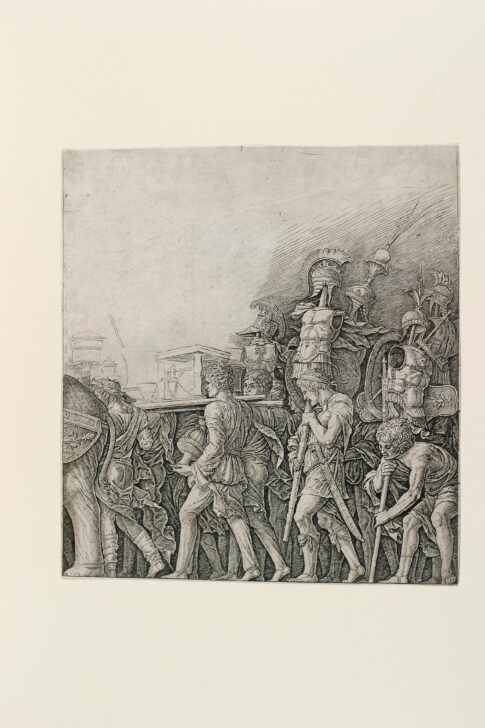Corselet Bearers
Giulio Campagnola

Description
Gallery Rotation Spring/Summer 2011
Giulio Campagnola
Italy, circa 1482–1515
The Corselet Bearers
circa 1498
Engraving
Museum purchase made possible through the generosity of Herbert Sloan, Marjorie Jackson, Katherine Aldrich, Richard and Linda Greene, and Meeyung Schmitter, 1997/1.534
Giulio Campagnola’s engraving shows a scene from a pageant in which corselets (armor that covered the torso) and helmets, as well as furniture, covered cups, and other valuables are displayed. It is based on a scene from a series of nine paintings by the northern Italian artist Andrea Mantegna (1430/31–1506) entitled the Triumph of Caesar that depicts a Roman procession of the spoils of war. The admiration of fifteenth-century Italians for their ancient Roman heritage was manifested in many forms, one of which was the reenacting of such triumphal processions, complete with replica objects. Mantegna’s paintings are an imaginative synthesis of his knowledge of Roman antiquities and these processions. They became very famous and were copied by other artists and transferred into engravings, which allowed for a wider dissemination of his compositions.
For some reason, Giulio did not extend the diagonal hatching lines of the background throughout the composition; another hand at a later date extended these lines using graphite that is still visible.
Subject Matter:
Giulio Campagnola’s engraving shows a scene from a pageant in which corselets (armor that covered the torso) and helmets, as well as furniture, covered cups, and other valuables are displayed. It is based on a scene from a series of nine paintings by the northern Italian artist Andrea Mantegna (1430/31–1506) entitled the "Triumph of Caesar" that depicts a Roman procession of the spoils of war. The admiration of fifteenth-century Italians for their ancient Roman heritage was manifested in many forms, one of which was the reenacting of such triumphal processions, complete with replica objects. Mantegna’s paintings are an imaginative synthesis of his knowledge of Roman antiquities and these processions.
Physical Description:
This print shows a procession of men walking from right to left across the foregound of the picture.They are dressed in short tunics and have laurel wreaths on their heads and some have swords.Some carry poles on which there are breast plates and helmets and some are holding litters piled with furniture, vessels and cups. There is an elephant that is partially shown at the far left.The background area is blank.
There are traces of additional diagonal hatching marks that had been added at a later date; those lines have been removed.
Usage Rights:
If you are interested in using an image for a publication, please visit https://umma.umich.edu/request-image/ for more information and to fill out the online Image Rights and Reproductions Request Form.